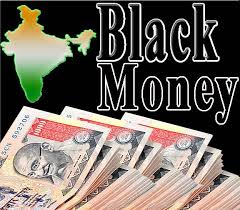In medieval England, there used to be strong, hardened killers, who roamed the country side and bartered their services for some resources. Their armour turned to blackish hue as they couldn’t afford the luxury of servants to polish it . They were called black knights. In the jousting matches, which were normally won by these killers, they got to keep the armour of the armour of the defeated person . These killers didn’t need an extra set of armour and would sell it back to the loser immediately after the fight. The loser would be forced to buy back their armour and this after market came to be known as the Black Market and the money this earned “Black Money” .
There is no specific definition of black money in particular, but there are several terms with similar connotation in use : Illicit wealth, black income, dirty income etc. are some of them. All these terms are used for income which is not reported to the authorities and thus in which any type of tax is not paid. Black money has both legal as well as illegal components. Generated from illegal activities may include proceeds from a range of activities like trafficking, smuggling, trade of narcotics, illegal trade in arms, fraud, illegal mining, illegal felling of forests etc. A considerable amount of black money is also generated through legal activities. This is done by manipulation of accounts, out of book transactions, manipulation of sale receipts etc .
Much hype has been created about the illegal wealth amassed by Indians, rich and corrupt, ever since the BJP campaigned for the 2014 general elections promising to bring back the black money stashed outside the territories of India . Contrary to popular belief that illegal money is held abroad, according to an article published in the Hindu, “only 10% of the black income generated annual accrues on foreign shores; 90% is in the country” .
Considering the black money that is stashed with foreign banks especially Swiss banks, it is estimated that one-third of all world wide funds held outside the country are kept in Swiss banks. A reason for the preference given to Swiss banks when it comes to hiding black money is the secrecy they maintain regarding the names of their account holders and the less or zero taxation policy for the foreign citizens. As a result of the secrecy maintained by the Swiss banks, the money deposited in these banks by foreign clients is unaccounted in their native country leading to tax evasion.
In the latest move against black money the government issued a list containing names of 627 people who are holding black money in foreign banks . Although it was hoped that these names would be made public, but the government has advised against it as it would be considered a violation of DTAA (Double Taxation Avoidance Agreement).
Thus , black money is a bane for every economy since its circulation makes ‘rich more richer and poor more poorer’ . Although efforts have been made to tackle the menace of black money, “Ache Din” are not yet round the corner .
Click here for government certification in Accounting, Banking & Finance





6 Comments. Leave new
well written about black money..
Great issue to be raised
Well written! This has become a serious issue globally, and needs to be raised.
Good explanation..!
similar topic but different & well explained article.
Very well Wriiten 😀